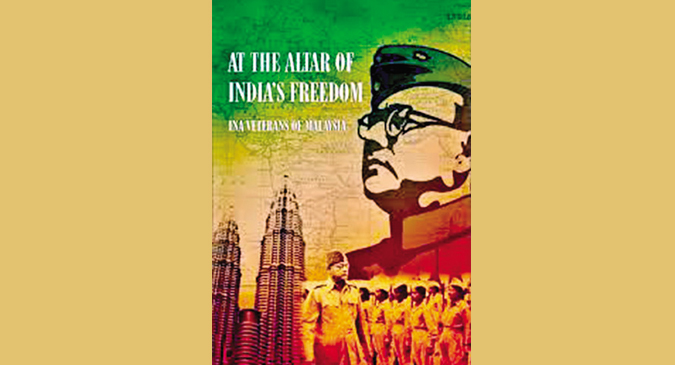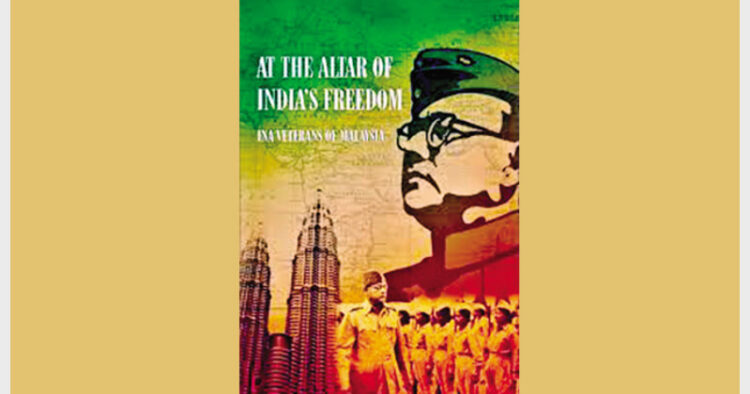Renaming Havelock and Neil islands, a part of Andaman and Nicobar, named after two officers of the East India Company, as Shaheed and Swaraj restores the glorious history of our freedom struggle
Choodie Shivaram
The Andaman and Nicobar Islands are intricately tied to the history of India. The mighty Chola Empire used these islands as a strategic base to launch their military expeditions to regions as far away as Indonesia. And yet, despite this proud heritage, in our collective national psyche, these pristine islands remain a demeaning black stain, evoking humiliating memories of Kala Pani and British depravity.

Poster of documentary “At the Altar of India’s Freedom-INA Veterans of ‘Malaysia’’
However, on December 30, 2018, these islands will once again receive their due recognition as the foremost example of Indian glory. For, not only were these the isles from where the Cholas sent forth their mighty armadas. This was also the spot where, 75 years ago, the Tricolor first flew above the soil of Free India, raised by Netaji Subhas Chandra Bose. Netaji also renamed these islands as Shaheed and Swaraj.
The Islands during the British Raj
To understand the power of these names, we must revisit the brutal history of these islands under the British Raj.
In 1789, Cornwallis realiSed the strategic importance of the Andaman Islands in the Indian Ocean. He forcibly ferried 200 Indians to these desolate islands, which were plagued with disease, pests, and attacks by tribesmen. Just a few years later, this settlement was abandoned due to disease.
The British didn’t just choose these islands as a Penal Colony for their desolate savagery. They deliberately chose these islands as the worst form of depredation they could inflict on any freedom-minded Indian. By forcibly moving the prisoners across the ocean to Kalapani, the British ensured that they would lose their caste, their standing in their own community, and their ability to communicate with the outside world – assuming they even survived the ordeal. They were, in effect, utterly dehumanised. The dreaded Cellular Jail was built with 600 cells, in such a manner that no prisoner could see or speak to one another. In effect, our greatest freedom fighters were placed in solitary confinement, in the most brutal conditions imaginable.

Subhas Chandra Bose(L) meeting Japanese PM Tojo(R) in 1943
However, by February 1942, after its humiliating defeat by the Japanese in Malaya and Singapore, British power was on the wane. Unable to bear the onslaught of the Japanese Imperial forces, the British on the island tucked tail and ran back to the mainland, leaving the island’s 27,000 residents (not including the natives) to the mercy of the invading Japanese, who captured Port Blair on March 23, 1942.
Enter Netaji Bose
On 21st October 1943, Netaji Subhas Chandra Bose inaugurated the Provisional Government of Azad Hind (PGAH) and appointed a council of Ministers. The next day, the Provisional Government declared war on Britain and America. A number of countries quickly accorded recognition to the Provisional Government.
Netaji served as the Head of State, Prime Minister, and Minister for War and Foreign Affairs for the PGAH, and took a solemn oath to serve his country and continue the sacred war of freedom till the last breath of his life.
On November 5, 1943, Bose addressed a conference in the Diet, the National Parliament of Japan. His speech was an immediate success, and following it, Japanese Premier Hideki Tojo announced that Japan would hand over Andaman and Nicobar islands to the PGAH. In the Diet, Tojo publicly assured Bose that Japan was “firmly resolved to extend all means in order to help to expel from India, the Anglo-Saxon influences which are the enemy of the Indian people, and enable India to achieve full independence in the true sense of the term”.
On November 26, 1943, in Syonan (Singapore), Bose announced to the Press that the PGAH had decided to rename the Andaman Islands as Shaheed (‘Martyr’), and Nicobars as ‘Swaraj’ (‘Self Rule’).
Bose’s decision to rename the islands was a tiger’s roar for freedom. It was a worthy name to honour the martyrdom of revolutionaries who had been lost to British inhumaneness. But more importantly, by renaming the islands, Bose sought to destroy the hold of terror that these islands had in the collective Indian psyche, and retake control of them, both physically, and figuratively.
With control of these islands, no longer would the PGAH be a government-in-exile. And no longer could the Indian government of Netaji Bose be considered a landless one, but one worthy of full consideration as a Sovereign and Independent nation.
The Army Chief of Staff, Gen. Sugiyama agreed that in the 1944 offensive, the INA would rank as an allied army under Japanese operational command, and not as a subordinate to the Japanese military forces.
On December 30, 1943, Bose visited the Andaman Islands, and hoisted the Tricolour, the first time it had flown on Indian soil. During this visit, he also paid a visit to the dreaded Cellular Jail. He enquired in great detail about the whereabouts of his friends and fellow revolutionaries who had been imprisoned there, only to be told that they had been moved to Calcutta.
PGAH Administration of the Islands
On January 6, 1944, Subhas Chandra Bose, as the Prime Minister of the Provisional Government of Azad Hind, appointed Maj. Gen. A.D. Loganadan, INA, as Chief Commissioner of the Andaman and Nicobar Islands. Even in the middle of his hectic wartime activities on the Burma-Imphal front, Bose took time to provide Loganadan with detailed instructions on the administration of the islands, and his team that would administer it.
Gen. Loganadan was a fierce and loyal soldier. His fellow INA Officer, Lt. Col. Gurbaksh Singh Dhillon said of him, “I recall his tall inspiring personality full of courage, spirit of sacrifice, wit, humor and the never failing sense of duty… Though ill health and non-co-operation by the Japanese Forces of Occupation made his job more and more difficult, yet he stood it out… this old man held the fort like a Knight from the medieval ages”.
Later, after the defeat and withdrawal of the Japanese in Burma, Gen. Loganadan manned the Burmese Capital of Rangoon with a 6000 strong INA contingent, and was successful in maintaining law and order to the extent that there was not a single case of dacoity or of loot.
And yet, even for the leonine Loganadan, the administration of the islands was a challenge. The Japanese Navy, however, remained in control of the islands’ administration, ostensibly to protect the islands from the combined British and American Naval threat.
In his March 15, 1944 report to Netaji, Loganadan, wrote about a rally held on 21st February 1944 to celebrate the first Provisional Government Day, and another rally on the following second Saturday to celebrate the victory in the Arakan sector of Burma. Yet, in the same report, he also wrote about severe shortages – of medicines, stationary and cutlery. He urgently requested medicines to treat dysentery, which was endemic, noting “All kinds of foodstuffs (sic) are scarce, and the chance of feeding the population with a well-balanced diet are remote”. The lack of full control was fiercely protested both by Loganadan and Netaji. On 21st June 1944, Netaji wrote to Loganathan, “I entirely agree with you that, without police powers, you cannot have prestige in the eyes of the people. You may tell the authorities that I am dissatisfied at the progress made in the transference of the administration”.
The Japanese Government had promised to transfer full control of the Islands, and of India after the conclusion of the war. Yet, as history notes, events conspired to act otherwise, and the INA’s administration of Free India remained short, and bittersweet.
After the Defeat
The government that the Provisional Government of Azad Hind had established on the Andaman and Nicobar Islands collapsed when the island garrisons of Japanese and Indian troops were defeated by British troops and the islands themselves retaken. The Provisional Government of Free India ceased to exist with the deaths of the Axis, defeat of the INA, and disappearance of Bose in 1945.
After Japan faced defeat in World War II and Britain regained control of the islands, the names Shaheed and Swaraj were wiped out, just like the names of the valiant INA soldiers who fought for the freedom we enjoy today.
Renaming Havelock and Neil islands, a part of Andaman and Nicobar, named after two officers of the East India Company, as Shaheed and Swaraj restores the glorious history of our freedom struggle.
(The writer is a senior independent journalist, author and documentary film maker. She recently directed a documentary “At the Altar of India’s Freedom-INA Veterans of ‘Malaysia’’ produced by Indian High Commission, Malaysia )













Comments